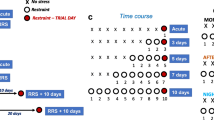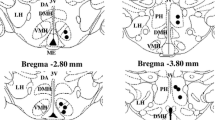Abstract
The recent finding of rebound hyperthermia in rats on the day after a single IP injection or oral intubation of ethanol was confirmed. In our studies, body temperature measured by rectal probe was significantly decreased for 8 h after 2.5 g/kg ethanol IP and was then significantly elevated 16–24 h after injection; increased vocalization during handling at 24 h was also found. However, rats isolated in a sound-attenuation chamber with remote temperature measurement showed no hyperthermia even though they were hypothermic during intoxication. The results do not support the hypothesis that rebound hyperthermia was caused by either a disruption of circadian rhythms, or by a mild abstinence syndrome alone. Instead, it appears that external stimuli, perhaps related to stress or associated with ethanol administration, are necessary on the day after a moderate dose of ethanol to produce the hyperthermia. Like hangover in humans, hyperthermia was reduced in rats made tolerant to ethanol: both the hypothermia and the rebound hyperthermia were significantly lower on the day after the 12th alternate-day ethanol injection than after the first injection. The aftereffects in rats of acute intoxication are, by definition, hangover signs, and they resemble hangover in humans in several ways, but their relevance as an animal model of hangover remains to be determined.
Similar content being viewed by others
References
Barry H III (1983) Adaptive behavior of alcohol tolerance and withdrawal. In: Ciero TJ (ed) Ethanol tolerance and dependence: Endocrinological aspects. Research Monograph No. 13, National Institute on Alcohol Abuse and Alcoholism. DHHS Publication No. (ADM) 83–1258. US Government Printing Office, Washington, DC, pp 16–26
Briese E, Quijada MG (1970) Colonic temperature of rats during handling. Acta Physiol Latinoam 20:97–102
Eikelboom R (1986) Learned anticipatory rise in body temperature due to handling. Physiol Behav 37:649–653
Freund G (1980) Comparison of alcohol dependence, withdrawal and hangover in humans and animals. In: Eriksson K, Sinclair JD, Kiianmaa K (eds) Animal models in alcohol research. Academic Press, London, pp 293–308
Gallaher EH, Egner DA (1987) Rebound hyperthermia follows ethanol-induced hypothermia in rats. Psychopharmacology 91:34–39
Gross MM, Lewis E, Best S, Young N, Feuer L (1975) Quantitative changes of signs and symptoms associated with acute alcohol withdrawal: Incidence, severity and circadian rhythms. Adv Exp Med Biol 59:615–631
Isbell H, Fraser HF, Wikler A, Belleville RE, Eisenman AJ (1955) An experimental study of the etiology of “rum fits” and delirium tremens. Q J Stud Alcohol 16:1–33
Khan MA, Jensen K, Krough HJ (1973) Alcohol-induced hangover: A double-blind comparison of pyritinol and placebo in preventing hangover symptoms. Q J Stud Alcohol 34:1195–1201
Lê AD, Poulos CX, Cappell H (1979) Conditioned tolerance to the hypothermic effect of ethyl alcohol. Science 206:1109–1110
Mansfield JG, Cunningham CL (1980) Conditioning and extinction of tolerance to the hypothermic effect of ethanol in rats. J Comp Physiol Psychol 94:962–969
Mucha RF, Pinel JPJ (1979) Increased susceptibility to kindled seizures in rats following a single injection of alcohol. J Stud Alcohol 40:258–271
Myrsten A-L, Rydberg U, Ideström C-M, Lamble R (1980) Alcohol intoxication and hangover: Modification by chlormethiazole. Psychopharmacology 69:117–125
Numan R (1986) Effects of Pavlovian conditioning on the ethanol withdrawal syndrome in rats. Pharmacol Biochem Behav 25:1111–1115
Sanders B (1980) Withdrawal-like signs induced by a single administration of ethanol in mice that differ in ethanol sensitivity. Psychopharmacology 68:109–113
Siegel S (1978) Tolerance to the hyperthermic effect of morphine in the rat is a learned response. J Comp Physiol Psychol 92:1137–1149
Siegel S (1987) Pavlovian conditioning and ethanol tolerance. Alcohol Alcoholism [Suppl] 1:25–36
Sinclair JD, Gustafsson K (1983) Toward an animal model of hangover. 3rd Finnish Symposium on the Biological and Medical Effects of Alcohol, Helsinki, Abstracts
Sinclair JD, Gustafsson K, Aalto J (1984) Hangover and the effects in rats on the day after a single ethanol injection. XV Annual Nordic Meeting on Biological Alcohol Research, Helsinki. Acta Pharmacol Toxicol 55, Suppl. 1: No. 4
Sinclair JD, Gustafsson K, Taira T (1986) Aftereffects of acute ethanol: Influence of administration route, tolerance, and the procedure for measuring body temperature. 3rd ISBRA Congress, Helsinki, Alcohol Alcoholism: A44
Stewart RJ, Eikelboom R (1979) Stress masks the hypothermic effect of naloxone in rats. Life Sci 25:1165–1172
Ylikahri RH, Huttunen MO, Eriksson CJP, Nikkilä EA (1974a) Metabolic studies on the pathogenesis of hangover. Eur J Clin Invest 4:93–100
Ylikahri RH, Pösö AR, Huttunen MO, Hillbom ME (1974b) Alcohol intoxication and hangover: Effects on plasma electrolyte concentrations and acid-base balance. Scand J Clin Lab Invest 34:327–336
Author information
Authors and Affiliations
Additional information
Offprint requests to: J. D. Sinclair
Rights and permissions
About this article
Cite this article
Sinclair, J.D., Taira, T. Hangover hyperthermia in rats: relation to tolerance and external stimuli. Psychopharmacology 94, 161–166 (1988). https://doi.org/10.1007/BF00176838
Received:
Revised:
Issue Date:
DOI: https://doi.org/10.1007/BF00176838




